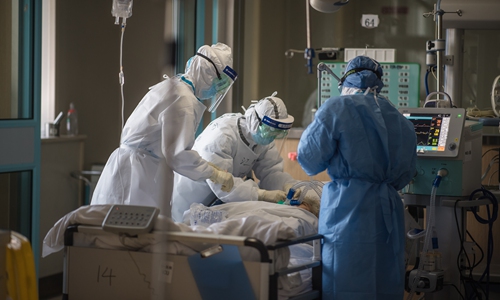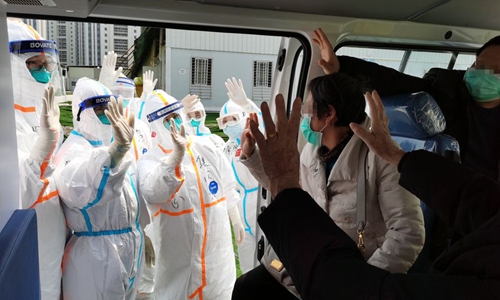Number of patients in critical condition down to zero in former virus epicenter Wuhan, a victory for China’s resource integration
By Shan Jie Source:Global Times Published: 2020/4/24 23:37:58

Medical staff members from Jiangsu Province work at an ICU ward of the Wuhan No. 1 Hospital in Wuhan. (Xinhua/Xiao Yijiu)
The number of COVID-19 patients in critical condition went down to zero in Wuhan, Central China's Hubei Province, after the last such patient in the city completed treatment on Friday. This milestone comes after tens of thousands of China's top medical professionals rushed to the city to fight against the deadly novel coronavirus in what was a tremendous showing of the country's resource integration capabilities.
Though it is hard to imitate what China has done in the past months, experts say China's experiences should be shared with countries around the world that are currently wrestling with the COVID-19 pandemic.
The milestone achievement was announced at a press conference in the city on Friday by Mi Feng, a spokesperson for the National Health Commission.
As of Friday, confirmed cases of COVID-19 had dropped to less than 50 and the province has recorded no new confirmed or suspicious cases over the past 20 days, he noted.
Over the past 10 days, China has been seeing a drop of imported cases from other countries, Mi noted.

Photo shows cured patients waving goodbye to medical workers before leaving the Leishenshan hospital in Wuhan, central China's Hubei Province, April 4, 2020. (Photo by Gao Xiang/Xinhua)
Since January, Wuhan has been covered in the shadow of the coronavirus. At its peak, there were more than 9,000 hospitalized patients in critical condition in the city. As of Thursday, Wuhan had a total of 50,333 confirmed COVID-19 cases and more than 3,800 fatalities.
More than 38,000 capable medical staff from other provincial regions in China were dispatched to Hubei for help, bringing medical supplies and advanced equipment.
Since March, the number of patients in critical condition had been dropping. On April 5, only 200 some critical condition patients remained in hospitals. Three days later, the city reopened after 76 days of lockdown.
China sent its "national team," "champion team" and each province's best teams of doctors and nurses to aid Hubei. Wuhan's victory shows China's medical expertise, as well as the country's ability in resource integration, Zhi Xiuyi, director of the Beijing United Family Hospital Lung Cancer Center, told the Global Times on Friday.
The enormous amount of critical condition patients was largely due to a lack of beds, medical personnel and resources during the early stages of the epidemic. However, with the medical teams from other regions joining the battle, the number of critical patients continued to drop daily as they were treated and stabilized, Zhi said.
Medical staff in other parts of the world are facing the dilemma of having to choose which patients to save due to "overwhelming demand and limited resources," media has reported. The situation has been prevalent in many countries severely hit by the pandemic, such as Italy and the US.
The total infected cases of the virus reached 2.7 million globally as of Friday morning, with the US having more than 860,000.
"No country has enough medical resources on hand to immediately react to a disease emergency like COVID-19," Zhi said, noting that China's ability to organize and shift its medical resources is a feat that other countries have found difficult to achieve, therefore some have chosen not to believe China's achievements.
"China tried so many ways to treat patients… new medicines, old medicines, as well as traditional Chinese medicines," Zhi said, noting that doctors and patients in China are willing to share their experiences and stories to help other countries still deeply suffering from the pandemic.
Zhi forecasted that during the upcoming Two Sessions, topics of improving the public health system, as well as the administration system to react to emergency public health events, will be tackled.
"We need to keep the heritage of our efforts during the epidemic alive," said the doctor.
Posted in: SOCIETY,FEATURE